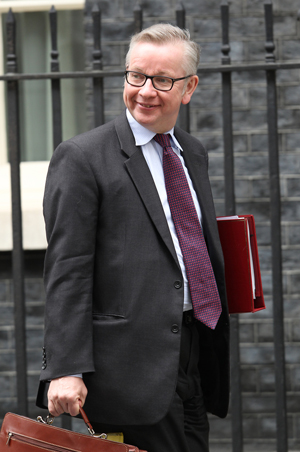Environment Secretary Michael Gove has promised to end the ‘offshoring of waste for others to deal with’, in the government’s eagerly-anticipated Resources and Waste Strategy, published this morning (18 December).
The 147-page Strategy – the government’s first major policy development in the waste and recycling sphere since the launch of the Waste Review in 2011 – outlines a series of commitments and areas for further consultation aimed at reducing waste and promoting resource efficiency.
Through policies set out in the Strategy, businesses and manufacturers will pay the ‘full cost of recycling or disposing of their waste’ Mr Gove has said, whilst councils face the possibility of being pushed towards a more consistent collection service – including mandatory food waste collections.
Impact-based targets
And, Defra will also seek to move away from using weight-based targets to measure local authority recycling performance, with a move towards ‘impact-based targets’. This is because of a perceived reliance on large volumes of garden waste for higher performing local authorities and of councils avoiding plastic collections because the material is light.
To aid improvements in both quality and quantity of dry recyclable material collected from the kerbside, which have plateaued at close to 45% in recent years, government will seek to establish a core set of materials collected by local authorities – as well as businesses.
Other steps outlined today include an increase in the single-use carrier bag charge from 5p to 10p and consultation on a deposit-return scheme for drinks containers from 2023.
A major review and overhaul of producer responsibility regimes for packaging, WEEE and batteries will also be instigated – in a bid to shake-up the funding of the collection and processing of waste so that more money is paid into the system by obligated businesses.
Extended producer responsibility
Packaging producers and users are likely to face higher bills for waste disposal and recycling, with data quoted in the strategy suggesting that just 10% of the end of life cost of products placed on the market currently is contributed through the producer responsibility system.
And, extended producer responsibility schemes will be designed to make producers create products that are more recyclable and have a greater scope for reuse, Defra has said.
Launching the strategy, Mr Gove said: “Our strategy sets out how we will go further and faster, to reduce, reuse, and recycle. Together we can move away from being a ‘throw-away’ society, to one that looks at waste as a valuable resource.
“We will cut our reliance on single-use plastics, end confusion over household recycling, tackle the problem of packaging by making polluters pay, and end the economic, environmental and moral scandal that is food waste.
“Through this plan we will cement our place as a world leader in resource efficiency, leaving our environment in a better state than we inherited it.”
Timeline
The strategy contains a useful Key Milestones chart for the development of consultations and potential implementations dates. This shows that generally new policies will not be implemented for several years.
Five ambitions
Policies set out in the strategy are designed to contribute towards one or more of five ‘strategic ambitions’ which include:
- To work towards all plastic packaging placed on the market being recyclable, reusable or compostable by 2025;
- To work towards eliminating food waste to landfill by 2030;
- To eliminate avoidable plastic waste over the lifetime of the 25 Year Environment Plan;
- To double resource productivity by 2050; and
- To eliminate avoidable waste of all kinds by 2050.
Consultations on the key policy areas are expected from early 2019, led by calls for evidence on the introduction of a deposit return scheme, consistency in the collection of dry recyclables from households, extended producer responsibility for packaging as well as for interim targets on packaging waste recycling.
In the longer-term, Defra will look to implement legislation to require mandatory food waste collections from 2023 and explore the possibility of a potential tax on waste sent to energy from waste facilities.
A focus on waste crime could see the introduction of compulsory electronic tracking of waste to clamp-down on illegal movements of waste at home and abroad, and tougher penalties for rogue crime operators.
Related links:
Resources and Waste Strategy 2018
The post Gove promises end to ‘offshoring’ of waste appeared first on letsrecycle.com.
Source: letsrecycle.com Packaging





